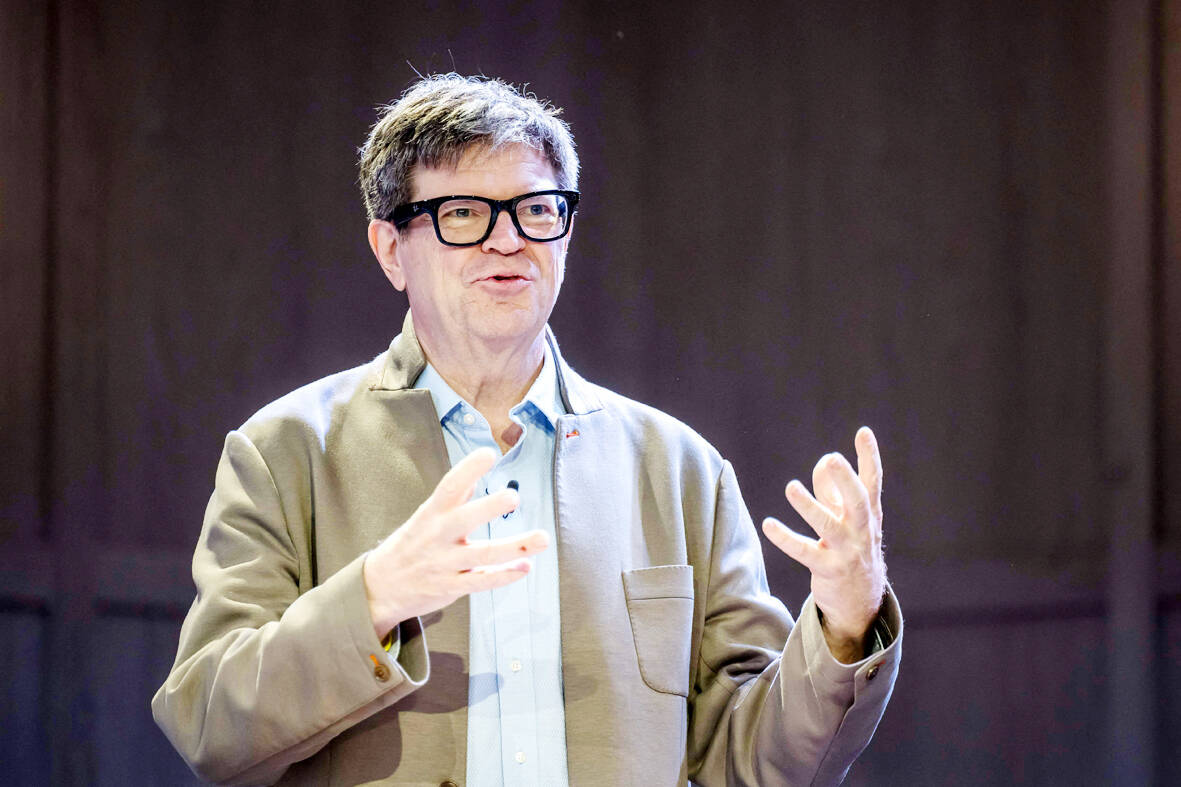One of the “godfathers” of modern artificial intelligence has predicted a further revolution in the technology by the end of the decade, and says current systems are too limited to create domestic robots and fully automated cars.
Yann LeCun, the chief AI scientist at Mark Zuckerberg’s Meta, said new breakthroughs are needed in order for the systems to understand and interact with the physical world.
LeCun spoke as one of seven engineers who were awarded the £500,000 (US$625,000) Queen Elizabeth prize for engineering on Tuesday for their contributions to machine learning, a cornerstone of AI.

Photo: AFP
Recent breakthroughs in the sector, led by the launch of OpenAI’s ChatGPT chatbot, have heightened expectations — and fears — of systems gaining human levels of intelligence.
However, LeCun said there was some way to go before AIs matched humans or animals, with the current cutting-edge technology excelling at “manipulating language” but not at understanding the physical world.
“There are still a lot of scientific and technological challenges ahead, and it’s very likely that there’s going to be yet another AI revolution over the next three to five years because of the limitation of current systems,” he said. “If we want eventually to build things like domestic robots and completely autonomous cars, we need systems to understand the real world.”
LeCun is working on systems that attempt to “understand” physical reality by forming a model that can predict how the world behaves. On current progress in AI, he said: “We’re not talking about matching the level of humans yet. If we get a system that is as smart as a cat or a rat, that would be a victory.”
However, LeCun’s fellow QEPrize winner and AI “godfather,” Yoshua Bengio, warned more progress was needed on the technology’s safety and called on next week’s global AI summit in Paris to grasp the issue.
“I’d like to see the leaders of this world to better understand the magnitude of what we are doing, both in terms of the power we’re creating, which could be for good or be dangerous, and the risks that come with that power,” he said.
In 2018, Bengio and LeCun shared the Turing award — seen as the equivalent of a Nobel prize for computing — with Geoffrey Hinton, who was also announced as a QEPrize winner on Tuesday. The award comes after AI pioneers won two Nobel prizes last year. They included Hinton — who shared the Nobel for physics with another recipient of this year’s QEPrize, the US physicist John Hopfield — and the Google DeepMind scientists among the winners of the chemistry prize.
Machine learning is a core process in developing AIs. Instead of being instructed directly, computers “learn” by analyzing data and then making informed decisions or predictions — such as what will be the next in a sequence of words.
The other winners of the 2025 QEPrize are: Li Feifei (李飛飛), the Chinese-American computer scientist who created ImageNet, a crucial dataset for training AIs to recognize objects; Jensen Huang (黃仁勳), the chief executive of Nvidia, the lead maker of chips used in operating and training AI systems; and Bill Dally, the chief scientist at Nvidia.
Patrick Vallance, the chair of the QEPrize foundation and the UK science minister, said the impact of machine learning was being felt across “industries, economies, and the planet,” The annual prize recognizes engineers whose innovations have a “significant impact on billions of lives around the world,” he said.

April 14 to April 20 In March 1947, Sising Katadrepan urged the government to drop the “high mountain people” (高山族) designation for Indigenous Taiwanese and refer to them as “Taiwan people” (台灣族). He considered the term derogatory, arguing that it made them sound like animals. The Taiwan Provincial Government agreed to stop using the term, stating that Indigenous Taiwanese suffered all sorts of discrimination and oppression under the Japanese and were forced to live in the mountains as outsiders to society. Now, under the new regime, they would be seen as equals, thus they should be henceforth

Last week, the the National Immigration Agency (NIA) told the legislature that more than 10,000 naturalized Taiwanese citizens from the People’s Republic of China (PRC) risked having their citizenship revoked if they failed to provide proof that they had renounced their Chinese household registration within the next three months. Renunciation is required under the Act Governing Relations Between the People of the Taiwan Area and the Mainland Area (臺灣地區與大陸地區人民關係條例), as amended in 2004, though it was only a legal requirement after 2000. Prior to that, it had been only an administrative requirement since the Nationality Act (國籍法) was established in

Three big changes have transformed the landscape of Taiwan’s local patronage factions: Increasing Democratic Progressive Party (DPP) involvement, rising new factions and the Chinese Nationalist Party’s (KMT) significantly weakened control. GREEN FACTIONS It is said that “south of the Zhuoshui River (濁水溪), there is no blue-green divide,” meaning that from Yunlin County south there is no difference between KMT and DPP politicians. This is not always true, but there is more than a grain of truth to it. Traditionally, DPP factions are viewed as national entities, with their primary function to secure plum positions in the party and government. This is not unusual

US President Donald Trump’s bid to take back control of the Panama Canal has put his counterpart Jose Raul Mulino in a difficult position and revived fears in the Central American country that US military bases will return. After Trump vowed to reclaim the interoceanic waterway from Chinese influence, US Defense Secretary Pete Hegseth signed an agreement with the Mulino administration last week for the US to deploy troops in areas adjacent to the canal. For more than two decades, after handing over control of the strategically vital waterway to Panama in 1999 and dismantling the bases that protected it, Washington has